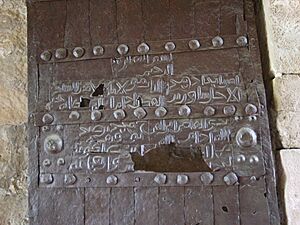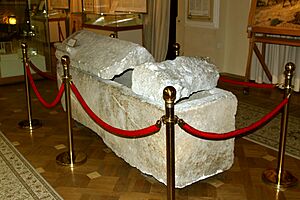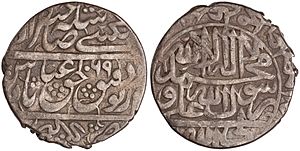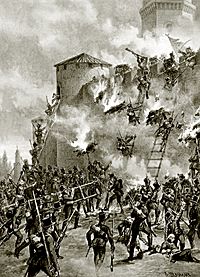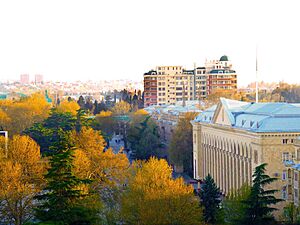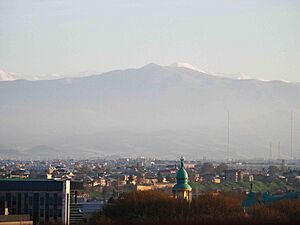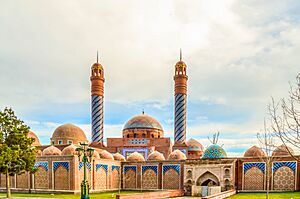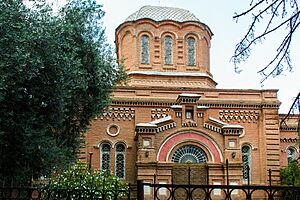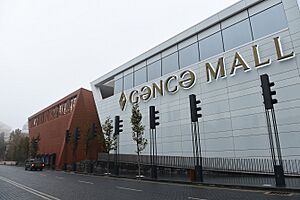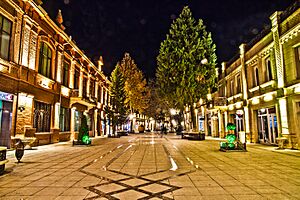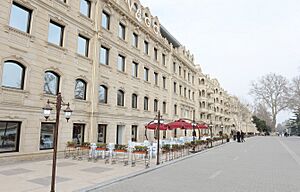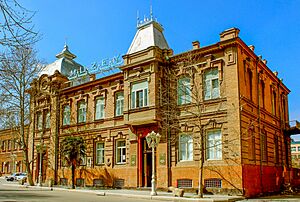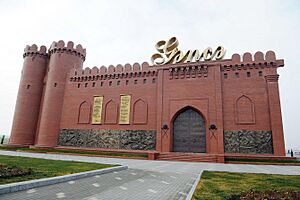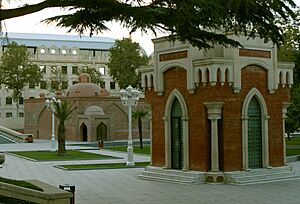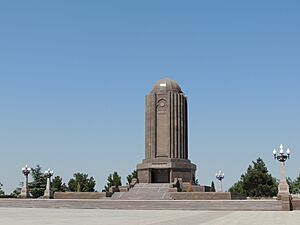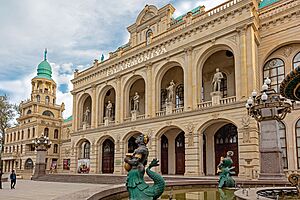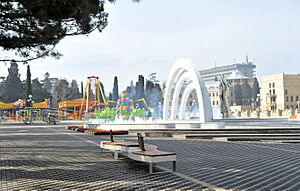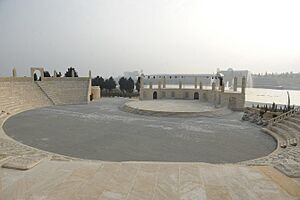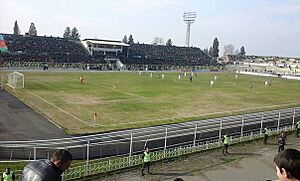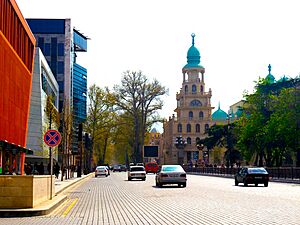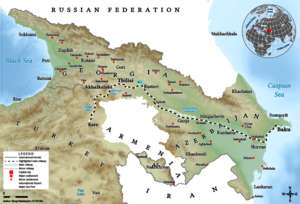Ganja, Azerbaijan facts for kids
Quick facts for kids
Ganja
Gəncə
|
||
|---|---|---|
|
City
|
||
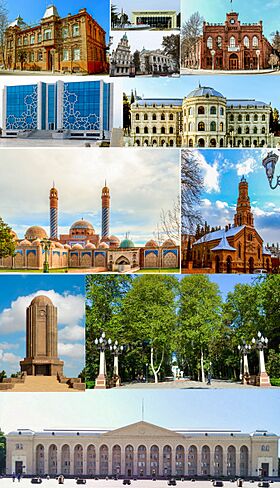 |
||
|
||
| Nickname(s):
Qırmızı Şəhər (Red City)
|
||
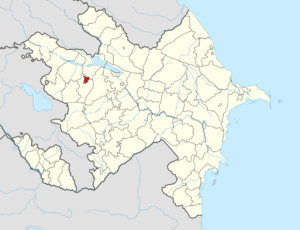
Ganja in Azerbaijan
|
||
| Country | ||
| Region | Ganja-Dashkasan | |
| Area | ||
| • Total | 110 km2 (40 sq mi) | |
| Elevation | 408 m (1,339 ft) | |
| Population
(2020)
|
||
| • Total | 335,600 | |
| • Density | 3,050/km2 (7,900/sq mi) | |
| • Population Rank in Azerbaijan | 3rd | |
| Demonym(s) | Ganjaly (Gəncəli) | |
| Time zone | UTC+4 (AZT) | |
| Vehicle registration | 20 AZ | |
Ganja (Azerbaijani: Gəncə) is the third largest city in Azerbaijan. About 335,600 people live there. Ganja has been an important historical and cultural place for a long time. It was once the capital of the Ganja Khanate until 1804.
After 1813, it became part of the Russian Empire. Later, it joined the Azerbaijan Democratic Republic and then the Azerbaijan SSR. Since 1991, it has been part of the independent Republic of Azerbaijan.
Contents
What's in a Name?
The name Ganja comes from the Persian word ganj, which means "treasure." Some old stories say the city was named because a treasure was found nearby when it was founded.
The city has had a few different names over time. In 1813, when it was part of the Russian Empire, it was called Yelizavetpol. Then, in 1924, it went back to being called Ganja. But in 1935, it was renamed Kirovabad to honor a Soviet politician. Finally, in 1989, during a time of big changes, the city got its original name, Ganja, back.
A Look Back in Time
Early History
Some historical records say that Ganja was founded around 859–860 by an Arab governor named Muhammad ibn Khalid. The story goes that he found a treasure and used it to build the city. This idea is supported by an Armenian historian who wrote about the city's founding around the same time.
However, the Persian origin of the name Ganja suggests there might have been an older town there before the Arabs arrived. The area where Ganja is located was known as Arran from the 9th to 12th centuries. Most people living in the cities there spoke Persian.
Ganja has been part of many different empires throughout history. These include the Sassanid Empire, Great Seljuk Empire, Kingdom of Georgia, and later Persian empires like the Safavid and Qajar empires. Ganja is also the birthplace of the famous Persian poet Nizami Ganjavi.
The city faced challenges after a big earthquake in 1139. It was also affected by the Mongol invasion in 1231. Ganja became strong again after the Safavid empire took control in 1501. The city was briefly taken by the Ottomans at different times but remained mostly under Iranian influence until the 19th century.
Ganja and the Russian Empire
For a short time, Ganja was renamed Abbasabad by Shah Abbas. He built a new city about 8 kilometers (5 miles) away, but the name soon changed back to Ganja.
In the late 1700s, Russia began to expand its territory southwards. In 1804, Russian forces led by General Pavel Tsitsianov attacked Ganja. This event started the Russo-Persian War (1804–1813). During the attack, many people in Ganja suffered greatly.
Russia won the war, and by the Treaty of Gulistan, Iran had to give the Ganja Khanate to Russia. The city was renamed Yelizavetpol after the wife of the Russian emperor. The local people, however, continued to call it Ganja.
Ganja in the 20th Century
In 1918, Ganja became the temporary capital of the Azerbaijan Democratic Republic. It was renamed Ganja again at this time. In 1920, the Red Army took control of Azerbaijan. Ganja saw an attempt to resist Soviet rule in May 1920, which caused damage to the city.
In 1935, the city was renamed Kirovabad. In 1991, Azerbaijan became independent again, and the city's old name, Ganja, was restored.
Ganja in the 21st Century
In recent years, Ganja has seen many changes and new buildings. It has grown into a modern city with tall buildings.
In 2020, during the Nagorno-Karabakh conflict, Ganja was hit by missiles several times. These attacks sadly caused civilian deaths and injuries.
Where is Ganja?
Location and Surroundings
Ganja is located in western Azerbaijan, about 375 kilometers (233 miles) from Baku. It sits on the Ganja-Dashkasan plain, at the base of the Lesser Caucasus mountains. The city is about 400–450 meters (1,312 to 1,476 feet) above sea level, on the Ganjachay river.
The city shares borders with the Goygol region to the south, west, and northwest, and the Samukh region to the northeast.
Weather in Ganja
Ganja has a cool, semi-dry climate. This means it doesn't get a lot of rain, with an average of 241 millimeters (9.5 inches) per year. Winters are cold and can have snow.
| Climate data for Ganja (1981–2010, extremes 1890–present) | |||||||||||||
|---|---|---|---|---|---|---|---|---|---|---|---|---|---|
| Month | Jan | Feb | Mar | Apr | May | Jun | Jul | Aug | Sep | Oct | Nov | Dec | Year |
| Record high °C (°F) | 22.8 (73.0) |
25.0 (77.0) |
28.0 (82.4) |
35.6 (96.1) |
39.5 (103.1) |
39.2 (102.6) |
42.0 (107.6) |
41.7 (107.1) |
38.8 (101.8) |
33.4 (92.1) |
29.0 (84.2) |
23.3 (73.9) |
42.0 (107.6) |
| Mean daily maximum °C (°F) | 7.1 (44.8) |
8.5 (47.3) |
13.2 (55.8) |
18.4 (65.1) |
24.0 (75.2) |
29.3 (84.7) |
32.1 (89.8) |
31.6 (88.9) |
26.3 (79.3) |
20.0 (68.0) |
12.9 (55.2) |
8.5 (47.3) |
19.3 (66.8) |
| Daily mean °C (°F) | 3.3 (37.9) |
4.3 (39.7) |
8.3 (46.9) |
13.1 (55.6) |
18.7 (65.7) |
23.6 (74.5) |
26.3 (79.3) |
25.9 (78.6) |
21.1 (70.0) |
15.3 (59.5) |
8.7 (47.7) |
4.7 (40.5) |
14.4 (58.0) |
| Mean daily minimum °C (°F) | 0.9 (33.6) |
1.6 (34.9) |
5.0 (41.0) |
9.4 (48.9) |
14.7 (58.5) |
19.3 (66.7) |
21.8 (71.2) |
21.6 (70.9) |
17.2 (63.0) |
12.2 (54.0) |
6.1 (43.0) |
2.4 (36.3) |
11.0 (51.8) |
| Record low °C (°F) | −17.8 (0.0) |
−15.2 (4.6) |
−12.0 (10.4) |
−4.4 (24.1) |
1.5 (34.7) |
5.8 (42.4) |
10.4 (50.7) |
10.5 (50.9) |
2.8 (37.0) |
−0.6 (30.9) |
−7.9 (17.8) |
−13.0 (8.6) |
−17.8 (0.0) |
| Average precipitation mm (inches) | 8 (0.3) |
12 (0.5) |
24 (0.9) |
31 (1.2) |
40 (1.6) |
32 (1.3) |
17 (0.7) |
15 (0.6) |
15 (0.6) |
24 (0.9) |
16 (0.6) |
7 (0.3) |
241 (9.5) |
| Average precipitation days (≥ 0.1 mm) | 7.0 | 7.0 | 8.0 | 8.2 | 9.0 | 7.0 | 4.0 | 3.0 | 4.0 | 6.3 | 6.5 | 6.0 | 76.0 |
| Average rainy days | 3 | 4 | 6 | 8 | 9 | 6 | 4 | 3 | 4 | 6 | 6 | 4 | 63 |
| Average snowy days | 3 | 5 | 2 | 0.2 | 0 | 0 | 0 | 0 | 0 | 0.4 | 1 | 2 | 14 |
| Average relative humidity (%) | 71 | 71 | 68 | 70 | 68 | 61 | 59 | 61 | 65 | 74 | 76 | 74 | 68 |
| Mean monthly sunshine hours | 120 | 113 | 141 | 182 | 229 | 267 | 278 | 252 | 212 | 168 | 123 | 115 | 2,200 |
| Source 1: Deutscher Wetterdienst (sun, 1961-1990) | |||||||||||||
| Source 2: Pogoda.ru.net | |||||||||||||
City Layout
Ganja is divided into two main administrative districts called rayons: Kapaz and Nizami. The mayor, Niyazi Bayramov, is in charge of the city's executive power. Ganja also includes six smaller settlements.
Kapaz District
Kapaz District was created in 1980. It covers about 70 square kilometers (27 square miles) and has a population of around 178,000 people.
Nizami District
Nizami District was also established in 1980. It was renamed Nizami District in 1989 when the city's original name, Ganja, was restored. This district is about 39 square kilometers (15 square miles) and has a population of around 148,000.
People of Ganja
Ganja is the third largest city in Azerbaijan. Its population is about 335,600 people. Many people who live in Ganja are refugees from Armenia or displaced people from the Nagorno-Karabakh region.
Historically, Ganja had a large and important Christian Armenian community. The traditional Armenian name for the city is Gandzak, which also means "treasure."
Famous People from Ganja
Many notable people have come from Ganja. These include:
- Nizami Ganjavi, a famous poet.
- Javad Khan, a ruler of the Ganja Khanate.
- Mirza Shafi Vazeh and Mahsati Ganjavi, both poets.
- Fikrat Amirov, a composer.
- Toghrul Asgarov, an Olympic champion in wrestling.
Faith and Religion
The main religion in Ganja is Islam, with most Muslims being Shia Muslims. Azerbaijan has the second-highest percentage of Shia Muslims in the world after Iran. Important mosques in Ganja include Shah Abbas Mosque and Goy Imam Mosque.
There are also other places of worship in the city, such as the Alexander Nevsky Church and the German Lutheran Church.
Economy and Jobs
Ganja's economy includes farming, tourism, and some industries. Minerals from nearby mines are used in Ganja's factories to make copper and aluminum. There are also factories for porcelain, silk, and shoes. Other businesses process food, grapes, and cotton from the farms around the city.
Ganja is known for its "Ganja silk" fabric, which was very popular in nearby countries. Many people in Ganja work in manufacturing, education, transportation, and service jobs. Large employers include Det.Al-Aluminium, Ganja Auto Plant, and Ganja Winery Plant 2.
Shopping and Fun
Ganja offers a mix of shopping experiences, from traditional shops on Javad Khan Street to modern places like Ganja Mall, the city's largest mall. Other shopping centers include Khamsa Park and Aura Park.
Ganja is a popular place for tourists because of its historic buildings. These include the Nizami Mausoleum, the Ancient Gates, Juma Mosque, and the Imamzadeh.
Other fun places to visit are the Bottle House and the Flag Square. The beautiful Goygol National Park, with lakes like Goygol and Maralgol, is also nearby.
In 2016, Ganja was chosen as the European Youth Capital. This was a big event that helped bring more tourists to the city.
Culture and Arts
Museums to Explore
The Ganja State History-Ethnography Museum is the oldest museum in the city. It has over 30,000 historical items. There's also the Nizami Ganjavi Museum, built in 2014, which has a research section and a library.
Other museums include the Heydar Aliyev Museum and the Museum of Modern Art.
Art Galleries
The Ganja State Art Gallery was opened in 1984. It showcases various artworks, including carpets.
City Architecture
Ganja is known for its Azerbaijani and Islamic architecture. Buildings in the city show the influence of the different people and empires that have ruled it. Many buildings are made of red bricks.
Old examples of Islamic architecture include the Nizami Mausoleum and the Shah Abbas Caravanserai. The Chokak Bath is another interesting traditional building.
A unique building in Ganja is the Bottle house of Ganja, which is made entirely of glass bottles.
Music and Media
The Ganja State Philharmonic was created in 1990. A new building for the Philharmonic Hall opened in 2017. It has a large concert hall and an open-air cinema.
Ganja has two local TV channels, Kapaz TV and Alternativ TV. Two newspapers, Gəncənin səsi and Novosti Qyandji, are also published here.
Parks and Green Spaces
Ganja has many beautiful parks and gardens. Khan's Garden is one of the most scenic, with many different trees and plants.
Other important parks include Heydar Aliyev Park Complex, which has an amphitheater for large events, and the "Ganja river" park-boulevard complex.
Sports in Ganja
Ganja has a professional football (soccer) team called Kapaz. They play in the Azerbaijani league and have won several titles.
The city also has Olympic Sports Complexes and the Ganja City Stadium, which can hold 27,000 people. In 2017, the "Ganja Marathon" was held, with 11,000 people participating.
Getting Around Ganja
Public Transportation
Ganja has a public transport system, mainly managed by the Ministry of Transportation. There are plans for a new subway line in the future. The city used to have a trolleybus system until 2004 and a tram system until the 1980s.
Air Travel
Ganja International Airport is the city's airport. You can fly from Ganja to Baku and also to Russia and Turkey.
Train Travel
Ganja is on a main railway line that connects Baku with the rest of the country. The Baku–Tbilisi–Kars railway also runs through Ganja. This railway connects Ganja directly with Tbilisi in Georgia and Kars in Turkey, allowing for both passenger and goods transport.
Learning and Education
Ganja has a long history of education. The first school in Azerbaijan for training teachers opened in Ganja in 1914.
Today, Ganja is home to four main universities and colleges. Ganja State University is one of them, founded in 1939. The city also has Azerbaijan State Agricultural University and Azerbaijan Technological University.
There are also schools that offer specialized education, like Ganja Music College and Ganja Medicine College. Additionally, Ganja has several vocational schools that teach practical skills.
Sister Cities
Ganja is twinned with several cities around the world. This means they have special friendly relationships and often share cultural programs.
 Derbent, Russia
Derbent, Russia Kars, Turkey (2001)
Kars, Turkey (2001) Kutaisi, Georgia (1996)
Kutaisi, Georgia (1996) Moscow, Russia
Moscow, Russia Newark, United States (2004)
Newark, United States (2004) Olomouc Region, Czech Republic (2012)
Olomouc Region, Czech Republic (2012) Ordu, Turkey
Ordu, Turkey Aksaray, Turkey
Aksaray, Turkey Tabriz, Iran (2015)
Tabriz, Iran (2015)
Images for kids
-
Nizami Ganjavi, a great poet.
See also
 In Spanish: Ganyá para niños
In Spanish: Ganyá para niños
 | Madam C. J. Walker |
 | Janet Emerson Bashen |
 | Annie Turnbo Malone |
 | Maggie L. Walker |



